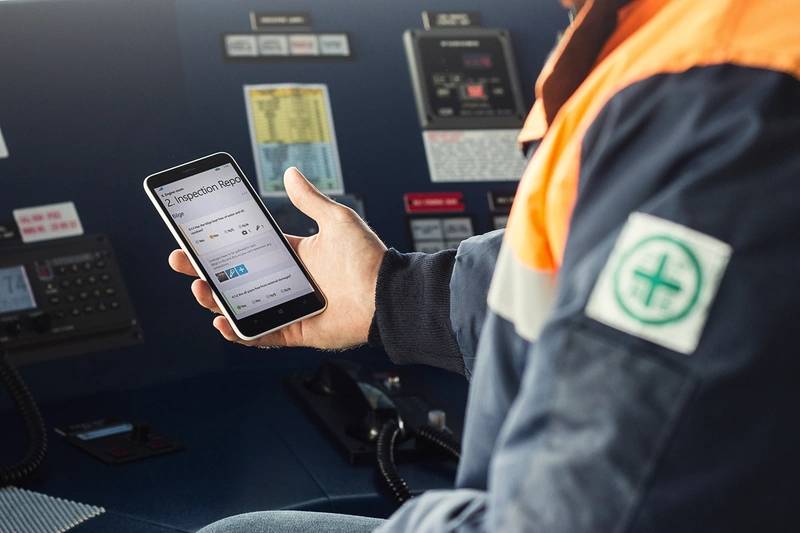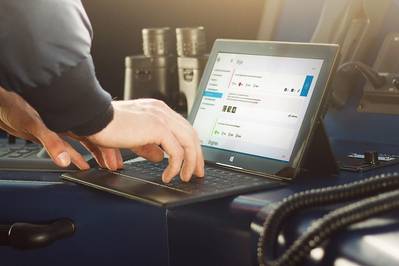Cloud Tech: An Enabler in the Digital Revolution
The shipping industry is finally embracing technology that is changing how companies operate. Despite lagging behind other industries, the shipping industry is currently experiencing an exciting period of digital transformation, with cloud technology and mobile apps welcomed by leading global shipping companies, changing ship management forever.
Companies are increasingly using mobile apps to manage all aspects of their business – to automate tasks, manage their processes, resourcing and to improve the wellbeing of seafarers, a trend that is expected to continue as the benefits become ever more apparent.
Driving this change is the increased availability of reliable connectivity at sea and cheaper costs, which is enabling more companies to access affordable fleet management cloud solutions and mobile apps.
Companies no longer need to rely on paper-based systems and can start to take advantage of digital solutions and use smart phones to manage their operations.
But what are the benefits for shipping companies?
Firstly, the technological revolution is benefiting crew enormously. According to Futurenautics Maritime’s Crew Connectivity 2018 survey of more than 6,000 seafarers, 75% now use the internet at sea – an increase of 32%, or more than half a million more crew (520,000, to be exact) since the 2015 survey.
Seafarers are typically using three devices on board, with smartphones the most popular device, as well as laptops and even smart watches and fitness trackers, says the report. This is enabling crew to keep in touch with family and friends when they are away at sea, which is hugely beneficial to their overall wellbeing.
A study this year by international maritime charity Sailors’ Society and Yale University found that more than a quarter of seafarers show signs of depression, while 45% of them had not approached anybody for help.
Having stable internet access allows them to communicate regularly with families and loved ones at home, plus they can use mobile apps to meet a range of needs, from mental health support and wellbeing, to knowing their rights and protecting the marine environment.
The Futurenautics Maritime report highlighted that there are major business benefits too, and the industry has acknowledged the pivotal enabling role connectivity plays in every aspect of their operations. Investment in technology is growing as a result as shipping companies develop better understanding of how technology can help their business.
According to the Navis Business Bellwether report, which tracks the perceptions, intentions and mindset of the global maritime industry, approximately 90% of respondents expect their company to increase technology spending this year and 56% indicate spending will increase by six percent or more.
Secondly, one of the biggest advantages of having improved connectivity and the use of cloud solutions and apps is being able to share data in real time. This is fundamentally changing how companies operate.
 Image: Hanseaticsoft
Image: Hanseaticsoft
In the past, accessing data and accurate information was a big challenge that often wasted time and resources. Without the cloud, different teams would be inputting and storing data in different systems, and data may not have been accessible or accurate or shared effectively with others.
This needed to change. Having accurate and up to date business critical information in one place and accessible to staff on or offshore is key to improving communication and collaboration between crew members on and off the ship.
Cloud technology is improving decision making and eliminating the need for additional data exchange. Staff no longer need to spend time sending emails back and forth, requesting or forwarding information.
Management decision making is also improved. With one source of true data, operators have a complete 360-degree overview of their fleet and entire operations which means they can react immediately and confidently to accurate information.
Thirdly, another major benefit is that cloud software doesn’t require big expense on new infrastructure and staff don’t need to have great IT skills. Most shipping cloud software is intuitive and requires minimal training. This can encourage companies previously reluctant to introduce new technologies to give it a try.
How are shipping companies using the cloud and apps?
Shipping companies are increasingly adopting cloud-based systems and using mobile apps on their smart phones to automate and improve tasks, from purchasing and stock planning, through to crew management and complying with regulations such as keeping track of waste, sewage and sludge disposals. Just as other industries have utilized apps, now shipping companies are using apps to manage their processes in a more accurate and reliable way. They can be particularly useful for areas such as purchasing, where companies benefit from web-based ordering and gain real time insight into budgets and operating expenses.
Companies are also using cloud-based solutions and apps to manage maintenance, so they can track and monitor jobs and repairs and add them to the system so they can be actioned immediately if needed. Plus apps are in demand for inspection reports, crew management and scheduling and stock taking. Staff wellbeing can also be addressed using cloud applications. For example, Hanseaticsoft offers a module within their Cloud Fleet Manager platform where the shifts and rest periods of crew members can be tracked and monitored to ensure companies comply with industry guidelines and standards.
Shipping companies are finally getting on board with cloud technology and increasingly using apps. This is bringing real benefits in terms of time saving and improved procedures on board, which in turn is driving huge efficiencies.
While many are sensibly taking a modular and gradual approach to introducing cloud solutions and apps, it’s clear the speed of digitization in the industry is accelerating. This is long overdue but the future looks bright for companies willing to invest and place their trust in technology.
About the Author
Alexander Buchmann founded Hanseaticsoft in 2009 to develop software solutions for shipping companies. Since March 2017, Lloyd's Register holds a share in the company.















